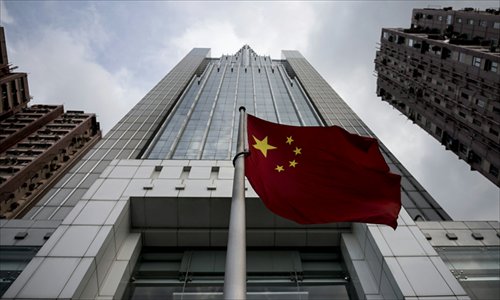HK election plan drafted
‘Strict’ nomination process expected despite opposition

The Chinese national flag flies in front of the Liaison Office of the Central People's Government in Hong Kong on Wednesday. Lawmakers in Beijing are reviewing the election method of Hong Kong's chief executive and are expected to announce their decision on Sunday. Photo: AFP
China's top legislator Zhang Dejiang on Wednesday presented a draft resolution on framework to elect Hong Kong's next leader, as opposition advocates continued to threaten large-scale protest if the political reform plan does not meet their requests.
The draft plan to grant universal suffrage for the elections for the post of Hong Kong Special Administrative Region chief executive in 2017 and the legislative council in 2016, will be submitted to the NPC Standing Committee for deliberation before its bimonthly session closes on Sunday, reported the Xinhua News Agency.
The resolution was drafted on the basis of a previous report submitted in July by Hong Kong Chief Executive Leung Chun-ying on suggestions to revise election methods for Hong Kong's next leader.
Exact details on the draft will not be released until Sunday when it is put to the vote by the whole plenary of the Standing Committee. NPC deputy Cheng Yiu-tong hinted the plan will be "strict," Hong Kong-based Now TV reported Wednesday.
According to a report by the Radio Television Hong Kong, some concrete rules have been laid out that the nominating committee will be comprised of members from four major sectors, which will pick two or up to three candidates.
Various reports by Hong Kong media outlets also indicate that the election framework will demand a 50 percent nomination threshold, which may cause opposition from the pan-democratic camp who are worried that they may be excluded.
A 50 percent nomination threshold means aspirants for the 2017 election will need support from half of the nominating committee to become a candidate before they could run in an election.
"Imposing the threshold is to make sure we could select candidates who 'love Hong Kong and love the country,'" Priscilla Lau Pui-king, a Hong Kong NPC deputy, told the Global Times on Wednesday.
Lau also expressed concern that the high nomination threshold might become the main reason why the Hong Kong pan-democrats may not support the plan.
"We still need to secure a few more votes in the legislative council for the plan to pass," said Lau.
"But the three meetings held by Li Fei [chairman of the Basic Law Committee of the NPC] earlier in Shenzhen has been immensely helpful in building consistent communication with the pan-democrats," she said.
Activists have warned they will blockade streets in the central business district if the standing committee fails to meet with "international standards" on universal suffrage in the framework set out on Sunday.
"We will organize a rally on Sunday and announce our upcoming plans in response to the NPC's decision," Occupy Central's co-founder Benny Tai Yiu-ting said.
The Hong Kong Federation of Students also threatened to organize strikes in universities as early as in mid-September if the plan announced on Sunday involves a requirement of 50 percent nomination threshold.
The authorities, however, have prepared for any possible fallout the move might trigger.
"Some incidents might happen after the Standing Committee of National People's Congress makes its decision on Sunday, [but] the central government has already been well prepared for that," Zhang, the top legislator, was quoted as saying by an NPC delegate Stanley Ng Chau-pei after a group meeting on Tuesday, reported Hong Kong newspaper Ming Pao.
"The incidents," although Ng did not specify, are believed by many to refer to the mass sit-in protest by the Occupy Central movement.
"The [Occupy Central's] seemingly high polling and protest numbers have been exaggerated, and are not likely to turn into actual participation in the Occupy movement," Gu Minkang, Associate Dean of the School of Law with the City University of Hong Kong, told the Global Times.
"It is difficult to predict the actual scale of the protest, but the Hong Kong police are experienced and capable enough in dealing with any situation … Participants in the movement will also be punished by the law," he said.
Li Fei, the Basic Law Committee chairman, will host a seminar in Hong Kong on September 1 to explain the Standing Committee's ruling.
"Whether the plan will be passed will depend a lot on Li's explanation during the seminar to convince the legislators," noted Lau.
Endorsement of the plan from at least two-thirds of Hong Kong's legislators is essential for the city's political reform to move forward, before the city leader and then the NPC make final approvals.